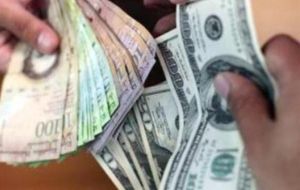MercoPress. South Atlantic News Agency
Venezuela clamps down on 'currency tourism' with random checks at airports
 Travelers can access dollars at the official rate of 6.3 bolivars per dollar, which on the black market can fetch about seven times the official rate.
Travelers can access dollars at the official rate of 6.3 bolivars per dollar, which on the black market can fetch about seven times the official rate.  Cadivi staff checking passengers' tickets: A trip to Peru entitles the maximum allocation of 3.000 dollars at the official rate
Cadivi staff checking passengers' tickets: A trip to Peru entitles the maximum allocation of 3.000 dollars at the official rate The 'dollar-scarce' Venezuelan government is trying to clamp down on what it calls “currency tourism” with random checks of passengers leaving the country. The officials at the country's main airports are not guards or police but bureaucrats at state currency board Cadivi investigating whether travelers' documents match their requests for hard-to-get dollars.
The new checks, launched this month, have contributed to infuriating, hours-long queues at the Simon Bolivar international airport, which serves Caracas, Venezuela's capital.
So-called “currency tourism” has become a major problem for President Nicolas Maduro's populist government as Venezuelans make profits using a play on the South American country's tightly regulated foreign exchange system.
There are strict limits on the availability of dollars at the official rate of 6.3 bolivars per dollar. But with an airline ticket, an individual can exchange Venezuelan bolivars for up to 3,000 dollars at that rate. Many of those greenbacks are diverted for sale on the black market, where each dollar can fetch about seven times the official rate.
The farther away the traveler's destination, the higher the allocation of dollars, meaning there is also a trade in illegal tickets to fool Cadivi when dollar requests are made.
“We're very rigorous on the authenticity of tickets,” said Cadivi security manager Rafael Marfisi as a line of travelers hurried to have their details checked in a computerized database.
“Many people tell Cadivi they're going to destinations such as Costa Rica, Peru and Ecuador. And then they travel to closer places such as Panama, Aruba or Curacao.”
A trip within the Caribbean entitles a Venezuelan to buy up to 1,000 dollars from the government at the official rate, while Peru warrants the maximum allocation of 3,000.
A decade of currency controls, first put in place by late leader Hugo Chavez, has largely failed to reduce capital flight and inflation.
Venezuela's economy is beset by shortages of consumer goods, and annual inflation rose to almost 50% last month.
The checks take place after travelers have passed through security and before they reach the airport's passport desks. The operation is a pilot program ordered by Maduro, who has vowed to crack down on currency tourism, which he says is part of an “economic war” being waged against his government.
Staff at the airport who normally search for illicit substances and contraband also now have the right to search a traveler's wallet or purse for dollars, or credit cards in the names of friends of relatives.




Top Comments
Disclaimer & comment rules-

-

-

Read all commentsOh well, they voted for him.......enjoy!
Oct 21st, 2013 - 09:05 am 0Oh the genius of the 'Bolivarian economic model' in all its glory.
Oct 21st, 2013 - 09:06 am 0Quoting Princess Leia:
Oct 21st, 2013 - 09:43 am 0“The more you tighten your grip, Tarkin, the more star systems will slip through your fingers.”
Can't help thinking this applies to the restriction of currency movement.
So Trolls how is the restriction of free access to foreign currency working in Venezuela and Argie land?
Given Venezuela's huge oil wealth how on earth have they gotten themselves in such a terrible economic position?
Commenting for this story is now closed.
If you have a Facebook account, become a fan and comment on our Facebook Page!